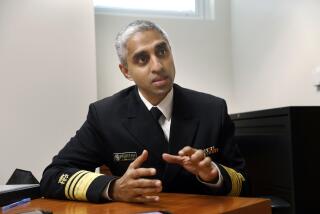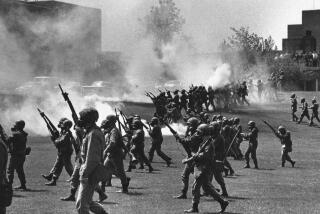How Much Bullets Actually Hurt Isn’t the Only Surprise
- Share via
I would have bet money that I knew exactly where Dr. William Rand Hardy was going with his argument.
He’s the director of the trauma unit at Western Medical Center-Santa Ana. That means he’s seen more than his share of people lying on gurneys, their bodies decorated with bullet holes in search of vital organs. Many times, the victims are teen-agers who have caught slugs from other teen-agers as a result of the county’s relentless gang warfare. What often gets Hardy’s attention after talking to the victims is how unmoved they seem to be by the whole thing.
That’s not to say there aren’t some common themes. “They seem genuinely surprised by how much it hurts,” Hardy said, “which I find fascinating. They’re always amazed at how much it hurts to be shot. But I don’t see any sort of battle fatigue. . . . The concept of wounding other people or them being wounded by other people just doesn’t seem to register at all.”
I interrupted Hardy’s workday last week to ask him about gun control, this just a few days after a group of med students from UC Irvine picketed a shop that manufactures handguns. The shop is one of several in the area that spit out the cheap guns that often end up supplying Hardy with his customers on the gurneys.
Hardy’s trauma unit sees between 80 and 100 people a month, he says, with as many as 35% to 40% there because of a wound as opposed to, say, a traffic accident. Of that percentage, the majority have been shot.
Like I said, I knew where he was headed as he talked.
“I think there’s no question that in the 15 years I’ve been doing this, the injuries have become much more severe as the overall weaponry has increased from the old days. In the old days, if gang-type people were going to fight, more often than not it was with a knife, and the wounds could be devastating but fairly easy to deal with.”
Not so today, he said. Now, people have guns and seem to enjoy shooting them. “So we see a lot more senseless injuries and they’re more severe because a bullet does more damage than a knife blade or a fist.”
Exactly, I thought. Hardy went on to say it’s rather obvious that, if guns were harder to get, “the number of gun-related injuries would decrease.” It would also follow, he said, that there would be a decrease in the severity of the injuries.
So, doctor, you’d be a soul mate with the pickets last week?
“I don’t have strong feelings about gun control one way or the other,” the doctor said.
“There are problems when a society or government tries to control arms,” he said. “It’s difficult for a few people to have power in a society, which the bearing of arms is, without it being abused. I’m a right-to-bear-arms advocate. I think it’s an important part of the democratic process, and I think it’s wrong for government to absolutely control guns.”
He was quick to note, however, that he has no philosophical problem with banning military-type weapons whose only purpose is “to maim and kill people.”
I told him I once did an informal survey among 10 or so apartment residents, shortly after someone with a gun killed a tenant. The residents split down the middle on gun control.
“I think among physicians you’d see the same bell-shaped curve,” Hardy said.
This isn’t to say that Hardy has no solution to the violence. He just isn’t sure society is prepared to do the long-range planning and committing.
Hardy deplores what he believes is the country’s misguided glorification of athletes. “If we focused on education and if teachers were the heroes in our society, I don’t think we’d have gang violence at all.”
The young victims he sees, he said, seem “incredibly closed off and incapable of understanding what’s happened to them. They really have no insight as to how they came to get shot. They really look upon it as you would look at getting struck by lightning on a golf course. There’s no sense that there’s a remedy for it or any understanding that any good could come out of the process of getting shot.”
Hardy sees these troubled youngsters shut off educationally, emotionally and in almost every other important way.
“I see kids that are very young,” he said, “say 12 to 15, that are essentially unable to verbalize and are so unskilled educationally that, essentially, it’s over for them. They can’t re-enter the system because they’re too far behind already. It’s absolutely tragic to see someone with a minor wound who’s very young, who you feel has no alternative but to go back into the system that shot them. That’s a very frightening thing, to talk to a 13-year-old and find out they have no interests, nothing to say and basically kind of already (are) so socially stunted that it’s going to be very difficult to recover and go on.”
I would have guessed a trauma surgeon would be a gun-control supporter. That someone like Hardy is not should tell the gun-control lobby how far away their victory is.
“The danger is that people will be happy focusing on gun control when they should be focusing on education, teen pregnancies and young people without jobs. Young people without jobs is the disease, guns are the facilitators and injuries are the outcome. My only quibble with the gun-control argument,” Hardy said, “is that it’s fine to control guns, but don’t forget that’s not what caused the problem.”
Dana Parsons’ column appears Wednesday, Friday and Sunday.
More to Read
Sign up for Essential California
The most important California stories and recommendations in your inbox every morning.
You may occasionally receive promotional content from the Los Angeles Times.










